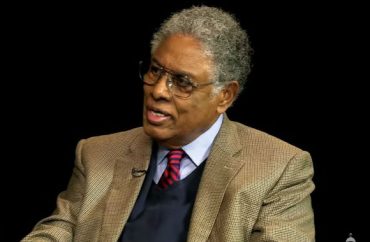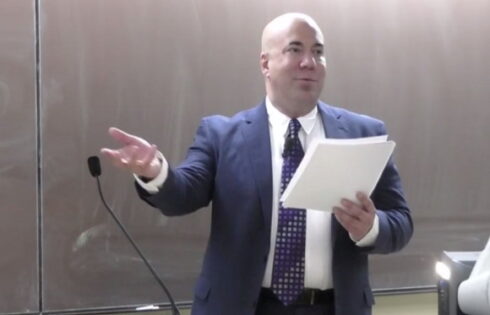
2016 has taken many important figures in pop culture from us, but it’s also taking an excellent writer and thinker who has influenced countless young people.
Economist Thomas Sowell, who has taught at several major universities going back to the 1960s, ended his quarter-century as a columnist for Creators Syndicate with his final entry today.
He’s a champion of the free market, a widely published author and senior fellow at the Hoover Institution, but that barely begins to describe his influence on how we think about everything from the government’s role in the economy to the lasting effects of race preferences.
He talked about his work just a few months ago on a Hoover program.
The 86-year-old starts his final column with a quip about his writing process – “Being old-fashioned, I liked to know what the facts were before writing” – but goes on to give the perspective of “old-timers” who have seen vast economic and social changes:
My own family did not have electricity or hot running water, in my early childhood, which was not unusual for blacks in the South in those days. …
Most people living in officially defined poverty in the 21st century have things like cable television, microwave ovens and air-conditioning. Most Americans did not have such things, as late as the 1980s. People whom the intelligentsia continue to call the “have-nots” today have things that the “haves” did not have, just a generation ago.
He blames “lying presidents” for wiping out Americans’ trust in government since Vietnam, but he’s especially sad about “social degeneration in black ghettoes,” citing his visit to a Harlem high school “some years ago”:
When I looked out the window at the park across the street, I mentioned that, as a child, I used to walk my dog in that park. Looks of horror came over the students’ faces, at the thought of a kid going into the hell hole which that park had become in their time.
MORE: Campus ‘diversity’ efforts are actually racist
When I have mentioned sleeping out on a fire escape in Harlem during hot summer nights, before most people could afford air-conditioning, young people have looked at me like I was a man from Mars. But blacks and whites alike had been sleeping out on fire escapes in New York since the 19th century. They did not have to contend with gunshots flying around during the night.
Sowell told Salon, of all places, how he came to his worldview, in a 1999 interview:
So you were a lefty once.
Through the decade of my 20s, I was a Marxist.
What made you turn around?
What began to change my mind was working in the summer of 1960 as an intern in the federal government, studying minimum-wage laws in Puerto Rico. It was painfully clear that as they pushed up minimum wage levels, which they did at that time industry by industry, the employment levels were falling. I was studying the sugar industry. There were two explanations of what was happening. One was the conventional economic explanation: that as you pushed up the minimum-wage level, you were pricing people out of their jobs. The other one was that there were a series of hurricanes that had come through Puerto Rico, destroying sugar cane in the field, and therefore employment was lower. The unions preferred that explanation, and some of the liberals did, too.
Did you discover something that surprised you?
I spent the summer trying to figure out how to tell empirically which explanation was true. And one day I figured it out. I came to the office and announced that what we needed was data on the amount of sugar cane standing in the field before the hurricane moved through. I expected to be congratulated. And I saw these looks of shock on people’s faces. As if, “This idiot has stumbled on something that’s going to blow the whole game!” To me the question was: Is this law making poor people better off or worse off? …
MORE: Philosophy prof says students too fearful to debate
What that said to me was that the incentives of government agencies are different than what the laws they were set up to administer were intended to accomplish. … You start thinking in those terms, and you no longer ask, what is the goal of that law, and do I agree with that goal? You start to ask instead: What are the incentives, what are the consequences of those incentives, and do I agree with those?
Scott Johnson at Power Line notes Sowell’s early role in taking on the progressive public intellectuals of the day such as John Kenneth Galbraith, a leading booster of government price-fixing whose influence remains strong today “in the Democratic Party and its media adjunct.”
As Sowell wrote in Commentary in 1975:
The only unifying thread running through Galbraith’s Keynesianism, market-“power” assertions, and “affluent-society” wastefulness theories is that we would all be better off to abdicate our tastes and preferences-and the market mechanisms through which they are expressed-in favor of the higher values and superior wisdom of the beautiful people, like Galbraith. From this perspective, it is only consistent that he does not bother to present serious evidence that would allow us to judge for ourselves.
MORE: How and why this former leftist student turned right
Like The College Fix on Facebook / Follow us on Twitter
IMAGE: Hoover Institution/YouTube






Please join the conversation about our stories on Facebook, Twitter, Instagram, Reddit, MeWe, Rumble, Gab, Minds and Gettr.